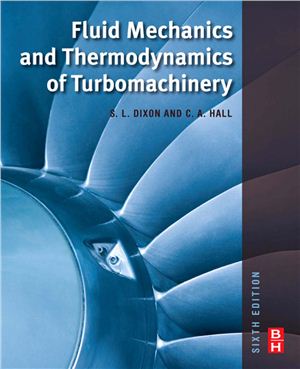6 edition. Butterworth-Heinemann, 2010. 481 p. ISBN:1856177939.
Turbomachinery is a challenging and diverse field, with applications for professionals and students in many subsets of the mechanical engineering discipline, including fluid mechanics, combustion and heat transfer, dynamics and vibrations, as well as structural mechanics and materials engineering. Originally published more than 40 years ago, Fluid Mechanics and Thermodynamics of Turbomachinery is the leading turbomachinery textbook. Used as a core text in senior undergraduate and graduate level courses this book will also appeal to professional engineers in the aerospace, global power, oil & gas and other industries who are involved in the design and operation of turbomachines. For this new edition, author S. Larry Dixon is joined by Cesare Hall from the University of Cambridge, whose diverse background of teaching, research and work experience in the area of turbomachines is well suited to the task of reorganizing and updating this classic text.
Contents:
Introduction: Basic Principles;
Dimensional Analysis: Similitude;
Two-dimensional Cascades;
Axial-flow Turbines: Mean-line Analysis and Design;
Axial-flow Compressors and Ducted Fans;
Three-dimensional Flows in Axial Turbomachines;
Centrifugal Pumps, Fans and Compressors;
Radial Flow Gas Turbines;
Hydraulic Turbines;
Wind Turbines;
Appendices.
Features:
- Provides the most comprehensive coverage of the fundamentals of turbomachinery of any text in the field
- Content has been reorganized to more closely match how instructors currently teach the course
- Coverage of fluid mechanics and thermodynamics, the basis on which good turbomachine performance depends, has been moved to the front of the book
- Includes new design studies of several turbomachines, applying the theories developed in the book
- Figures have been updated, along with new photos added, to better illustrate the topics presented
- Includes new examples and additional end-of-chapter exercises.
Turbomachinery is a challenging and diverse field, with applications for professionals and students in many subsets of the mechanical engineering discipline, including fluid mechanics, combustion and heat transfer, dynamics and vibrations, as well as structural mechanics and materials engineering. Originally published more than 40 years ago, Fluid Mechanics and Thermodynamics of Turbomachinery is the leading turbomachinery textbook. Used as a core text in senior undergraduate and graduate level courses this book will also appeal to professional engineers in the aerospace, global power, oil & gas and other industries who are involved in the design and operation of turbomachines. For this new edition, author S. Larry Dixon is joined by Cesare Hall from the University of Cambridge, whose diverse background of teaching, research and work experience in the area of turbomachines is well suited to the task of reorganizing and updating this classic text.
Contents:
Introduction: Basic Principles;
Dimensional Analysis: Similitude;
Two-dimensional Cascades;
Axial-flow Turbines: Mean-line Analysis and Design;
Axial-flow Compressors and Ducted Fans;
Three-dimensional Flows in Axial Turbomachines;
Centrifugal Pumps, Fans and Compressors;
Radial Flow Gas Turbines;
Hydraulic Turbines;
Wind Turbines;
Appendices.
Features:
- Provides the most comprehensive coverage of the fundamentals of turbomachinery of any text in the field
- Content has been reorganized to more closely match how instructors currently teach the course
- Coverage of fluid mechanics and thermodynamics, the basis on which good turbomachine performance depends, has been moved to the front of the book
- Includes new design studies of several turbomachines, applying the theories developed in the book
- Figures have been updated, along with new photos added, to better illustrate the topics presented
- Includes new examples and additional end-of-chapter exercises.

